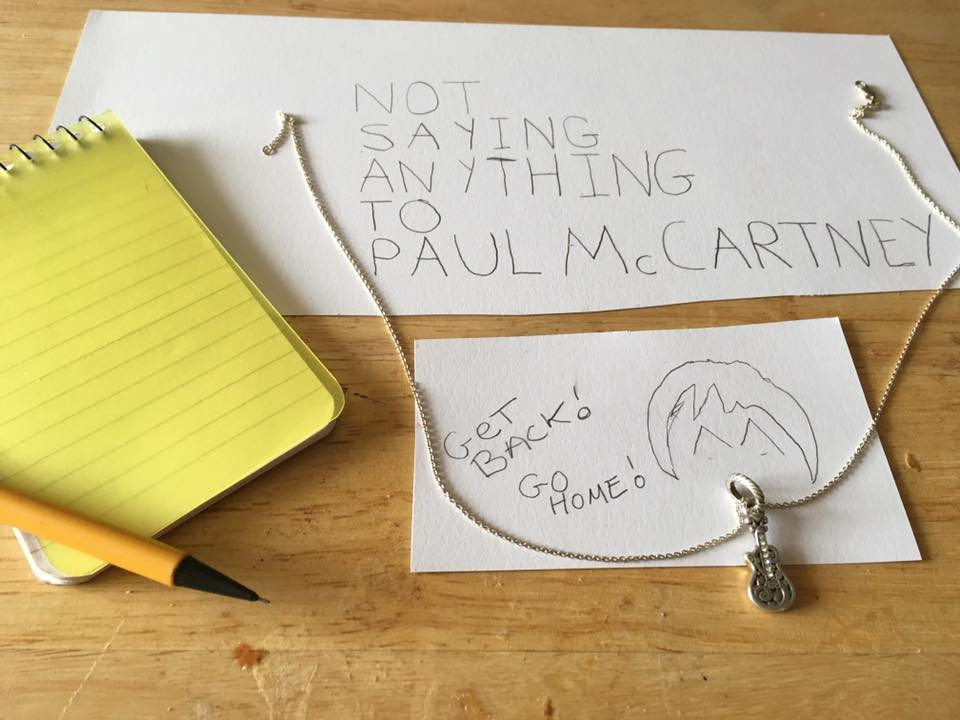ES-Say #52- It was 35 years ago. (Not today, but on Tuesday)
December 8th, marked the sad anniversary of John Lennon's murder in 1980. A milestone of it being 35 year since, most Lennon and Beatles fans took time to remember him on the day. It seems unbelievable that such a tragedy happened in the first place. If, like myself, you were too young to remember, the event was explained over the years from older family members or relayed through media archives. By all accounts, it seemed to be the shocking moment of the new 1980s decade and everything changed. Paul McCartney had his second solo LP out that year, McCartney II, and had gone into the studio with George Martin on that tragic day, to work and surround himself with other people whom, like himself, were numbed to the news. The press wanted a reaction from John's former musical partner , and unfortunately for McCartney, the press ran with his quick, and now infamous, "it's a drag" comment. McCartney has explained how this comment was taken out of context and has dissected that situation more times than I can count. I've never faulted him for making the comment, and understand the circumstances surrounding it. I just don't understand why it has to be pointed out, either by himself, or interviewers, time and time again.
Reading through the lines, there is a clear and reasonable recount of McCartney's true feelings after the event. While this is interesting and he continues to reminisce about his relationship with John, a few observations(or public opinions) have come up within the last thirty five years. Personally, due to my age and becoming interested in McCartney's solo career since 1993, my own opinions on this topic(McCartney's posthumous response to Lennon) can only fairly discuss the last twenty years.
Had it not been for the Beatles Anthology documentary, broadcasting in 1995, McCartney probably would have not had much opportunity in the 1990s to squarely focus on his unique long term relationship with his friend and bandmate. John Lennon, not being able to collaborate on The Beatles 60s career retrospect of Anthology, left an irreplaceable void. The two new songs to be released in connection with the project, "Real Love" and "Free As A Bird" were created using unreleased solo material from John. It was an attempt to get "The Threetles"(Paul, Ringo, & George) to create new "Beatles" songs.
The release of these songs did receive some backlash. I can remember that this move wasn't celebrated. I also don't remember anyone at the time calling Paul, Ringo, and George "Threetles". My cassette single('member those) of "Free As A Bird" clearly listed "The Beatles" as the artist. It was quite accepted that the two singles were brand new. These manufactured songs were also considered a cheap move to make a quick buck. I have no way of making this sound better than what it was. The accompanying rare demos and unleased 60s material from the Anthology mid 90s music albums were expensive on CD. Being a teenager, I repeated the same thing that had happened when "Live at The BBC" recording were sold in shops, I bought blank cassette tapes and recorded the radio specials that premiered in connection with the releases. It was more welcome to hear the rare "In Spite of All The Danger" being performed by half The Beatles(Paul and George) prior to Beatlemania, than a pieced together song like "Free As A Bird" featuring all The Beatles. I even had a political cartoon on my wall at the time that joked these brand new songs were created using John's old answering machine recording. "Hi, I'm not home, leave a message at the tone". It really felt that the remaining Beatles were grasping at straws using rejected Lennon material in regards to the "new" songs.
McCartney's solo career in the 1990s was probably stronger than the period a decade later. He was highly successful and the work became part of McCartney cannon. He had embraced his Beatles past and played versions of Beatles songs that he hadn't attempted earlier during Wings' 1970s live shows. The late period of the 1990s/Early 2000 was reserved for coping post-Linda McCartney death. Going back on tour in the early '00, McCartney had a band besides him, but another void was obvious without Linda being present at the keyboards. Combining the deaths of his first wife, with now both George's passing and memories of Lennon is a tall order but the grieve was now shared rather than a solo focus concerning Lennon. Over the last fifteen years, McCartney is more prepared for interviewer, knowing that the questions will cover his reactions after John's death. George and Linda, on occasion will be covered in interviews, but it inevitably packs a punch for the media stories to ask about Lennon, and it often can become a bit rehearsed or reanalysis.
No one, including McCartney, can project what Lennon might have become over the recent decades because his life was taken so unexpectedly. Some might say The Beatles break up may have been a good thing because it occurred through the decision of all four equally, and sometimes this fact should be memorialised for how it naturally came about. Everything since 1980 cannot be fairly represented as a true representation to how he, Lennon, may have felt. Paul got it right when he opened up in the song, "Early Days"(2013) concerning actual history. He "lived through those early days" where as many of us can't even actually understand this particular situation on a personal level, but we can still empathise to the pain of publically losing a close friend.

No comments:
Post a Comment